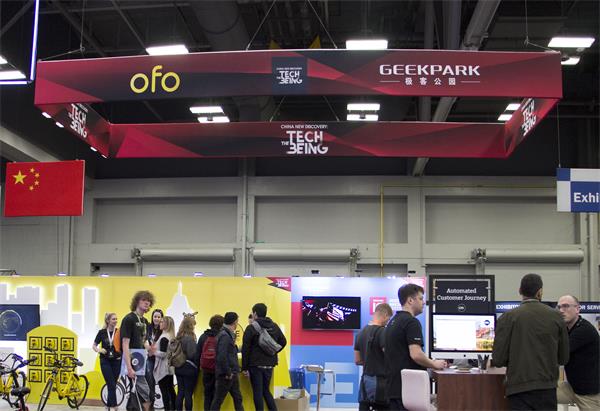China tech shines at SXSW

China's bay area represents 67 million people with $1.4 trillion GDP a year, McLaughlin said.
When the bullet train system under construction is completed in a couple of years, the commute between the cities will be shortened to less than an hour.
The hyper connected region forms a super cluster, with each city focusing on a major area: Hong Kong on fintech, Shenzhen on electronics and IoT, Guangzhou on auto and fashion and Tech and Macau on gaming and virtual reality.
"China has made the structure to make this super cluster work for a long time. The government provides grants and incentives to people who want to be part of it. It’s where the convergence comes. When you have that many people working toward the same direction, it will be big," said McLaughlin.
While the greater bay will have more impact on people in the next two or three years, China’s Belt Road Initiative makes the greater bay look like nothing, McLauglin said.
"This system is the modern version of the Silk Road. Already 68 countries have signed up which represents 65 percent of the entire world population and 40 percent of the world's GDP. When China goes big they go massive, there is nothing in history like this," he told the crowd. "This is the China century; we are just living in it."
Zhang Peng, founder and CEO of China's GeekPark, said that more and more Chinese tech companies are capable of developing their own core technologies and have the ability to expand globally.
Beijing-based GeekPark is one of China's largest internet and technology innovation platforms. For the second year, the company organized Chinese companies to exhibit at SXSW.
Other Chinese companies were there. Alibaba's senior director Paul Fu discussed the company's two successful shopping festivals. He said the company plans to make future shopping more personally tailored and there was much room to grow in that area.
Leung Shanying, design director of Ant Financial, a subsidiary of Alibaba, showed how Alipay helps to break the barrier of international borders, revolutionize retail sales and give people equal access of payment.
Zou Xiaowu, CEO of Yeahmobi, China's leading mobile marketing platform, presented China's important role in mobile apps in the global market — about 60,000 apps are from China.
Nikita Huang, marketing manager at DataMesh, discussed how to mix big data with reality in real time to produce interactive video programs such as creating a fire-breathing dragon or dancing with a virtual avatar. The company enthralled the visitors with its interactive program at the SXSW trade show.
Overall, more than 60 Chinese companies attended SXSW this year, a big jump from last year's 15.
Hugh Forrest, chief program officer at SXSW, said that there is more advanced usage in mobile technology in China than in the US, and it's a big value to have Chinese companies present their stories at SXSW.
For SXSW 2019, Forrest said that he hoped to see more hardware companies from China next year on top of the innovative ideas from the mobile sector. "We will continue to build that bridge from Austin to Beijing and China," he said.

China tech makes a show at SXSW 2018 in Austin, Texas. [Photo/MAY ZHOU / CHINA DAILY]
MOST POPULAR
- 1 China to give visa-free treatment to another 9 countries
- 2 China fully opens manufacturing sector to foreign investors in landmark opening up move
- 3 China's import expo attracts record-breaking participating countries, exhibitors
- 4 China's door opening even wider to foreign visitors, businesses
- 5 China revises rules to ease foreign strategic investment in listed firms
Editors' Picks
 Video:
Peru sees new port open
Video:
Peru sees new port open
 Infographic:
China's public holidays for 2025
Infographic:
China's public holidays for 2025
 Infographic:
Basic facts of APEC
Infographic:
Basic facts of APEC
 Infographic:
Wrapping up the 7th CIIE: Data recap
Infographic:
Wrapping up the 7th CIIE: Data recap



